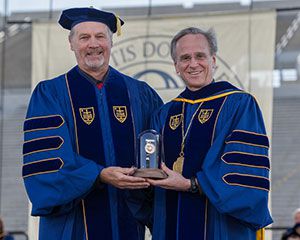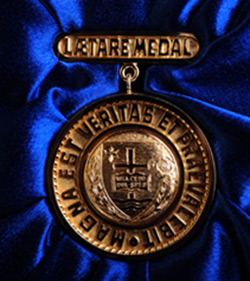Recently I was contacted by a Catholic biblical theologian with whom I've been friends since my undergraduate days,  who has been invited to give a talk on creation and evolution in an East Coast parish. Knowing that a prominent member of the parish staff is not friendly to evolution, he asked me what I would say to a Catholic with a master’s degree in science who claims that “the Church accepts micro-evolution but rejects macro-evolution.”
who has been invited to give a talk on creation and evolution in an East Coast parish. Knowing that a prominent member of the parish staff is not friendly to evolution, he asked me what I would say to a Catholic with a master’s degree in science who claims that “the Church accepts micro-evolution but rejects macro-evolution.”
I told my friend Jim that the micro/macro distinction as employed by this deacon to discredit evolution is bogus. It is not a scientific distinction but rather a fiction invented by "young earth creationists" who want desperately to appear to be engaging in science. The distinction is no more valid than is the idea of so-called “irreducible complexity.” Further, I told him that from a scientific perspective it is irrelevant what the Christian Church, or Islam, or Buddhism accepts about evolution, or gravity, or quantum mechanics. Science merely describes the world and explains how it works; it is up to religions and individuals to invest the world with meaning, whether that meaning makes reference to a God or not.
How could a church leader arrive at his seventh decade without an elementary understanding of and appreciation for evolutionary biology? How could he be ignorant that his own Pope Emeritus Benedict XVI in Communion and Stewardship (2002) had reached the conclusion that "since it has been demonstrated that all living organisms on earth are genetically related, it is virtually certain that all living organisms have descended from this first organism [3.5 billion yrears ago]". Such clerical ignorance about the natural world may be explained in part by the fact that students often do not receive either a scientific or a theological education with much depth to it. The scientific thinking of religious communities—like that of the general culture in which they are embedded—stands in need of a serious housecleaning.
The perfect person to direct such a thorough housecleaning might be Dr. Kenneth R. Miller, a longtime friend of NCSE who has spent forty years educating students and the wider public about the exciting nature of the scientific enterprise. Miller is a renowned cell biologist selected as the 2014 winner of the Laetare Medal, conferred upon a person "whose genius has ennobled the arts and sciences, illustrated the ideals of the church and enriched the heritage of humanity."“Laetare” is the Latin word for “rejoice,” and in announcing this year’s recipient Notre Dame President Rev. John I. Jenkins, C.S.C said:
Kenneth Miller has given eloquent and incisive witness both to scientific acumen and religious belief. As an accomplished biologist and an articulate believer, he pursues two distinct but harmonious vocations and illustrates how science and faith can mutually flourish.
Kenneth Miller is widely known not only for his work in cell biology and his high school biology textbook, co-authored with Joe Levine, but also for his active participation in the dialogue between religion and science. He served as an expert witness at the Kitzm iller intelligent design creationism trial in Dover, Pennsylvania in 2005. He is also a practicing Roman Catholic who has not experienced the debilitating assumption that science and religious belief are mutually exclusive. In 2007, he wrote Finding Darwin's God: A Scientist's Search for Common Ground between God and Evolution, followed in 2009 by Only a Theory: Evolution and the Battle for America's Soul.
iller intelligent design creationism trial in Dover, Pennsylvania in 2005. He is also a practicing Roman Catholic who has not experienced the debilitating assumption that science and religious belief are mutually exclusive. In 2007, he wrote Finding Darwin's God: A Scientist's Search for Common Ground between God and Evolution, followed in 2009 by Only a Theory: Evolution and the Battle for America's Soul.
In his commencement address "Science, Learning, and Faith," Miller described the Laetare Medal to the graduating students:
Of several words that are inscribed upon this medal, to me the most significant is Veritas, the Latin word for truth. What is truth? In many ways, that’s what Notre Dame is all about. It is also what science is all about, and I see this medal, given to a scientist for the first time in many decades, not as an individual award, but as a powerful statement by Notre Dame about science, learning and faith.
Miller said there are two common and destructive myths about science. The first comes from today’s emphasis on the practical, economic value of the scientific enterprise, “rooted in the reality that science really does help us to make things, invent new technologies and cure diseases.” The problem arises when society tells us that scientific knowledge is only valuable when it is practical, quantifiable, or able to have a precise dollar value assigned to it.
“If you’re not going into medical school, why study biology? If you’re going into business, who cares about the chemical bond? And if you’re not going to be a physicist, why study physics?” Countering this Miller reminded the students that “Science is not a body of knowledge. It’s a way of thinking. It’s a search for truth that illuminates every aspect of the human condition.”
The second myth about science is that it stands in implacable opposition to faith. Miller pointed out that ironically, this myth bolsters the position of the enemies of both faith and science:
Science, we are told, is reason based upon evidence. And faith, we are assured, is belief without reason. As such, the two are locked forever in conflict and cannot coexist. But such assertions ignore the very history of western science, which has its roots in a faith that views the study of nature and its mysteries as a way to praise and understand the glory of God. It was in that tradition that Newton unwove the rainbow and revealed the laws of motion, that Father Gregor Mendel established the science of genetics, and that Father Georges Lemaitre developed the theoretical foundation for cosmic expansion. Yes, it was a Catholic priest who first described the physics of the real big bang.
Miller noted that both Theodosius Dobzhansky, who famously said that “Nothing in biology makes sense except in the light of evolution,” and Asa Gray, Darwin’s first great advocate in America, were men of faith. Both of these evolutionary biologists understood that faith, “far from being the antithesis of reason, is actually the source of reason.” Science is built upon two great elements of faith. The first is that the universe is rational, understandable and accessible to human thought. The second is that truth is to be preferred to ignorance.”
In conclusion, Ken Miller declared to the graduating class that a faith requiring one to reject scientific reason is not a faith worth having:
But a faith asserting that knowledge matters, that the world is knowable and that human reason can unlock the secrets of life is indeed a faith worth embracing. And I would hope that such a faith has graced every day of your time at Notre Dame…And I would hope that each of you, as you leave these halls today, has come to regard science for what it truly is: a branch of learning that deepens the human spirit and enriches the poetry of life itself.
This is a truth I would expect a deacon with six decades under his belt to have internalized in his youth for communication to the faithful in his parish. A century and a half after Darwin first articulated his theory, evolution has gone from strength to strength as the most cogent explanation of the diversity and the relatedness of life on Earth. Catholics have a right to expect from their religious leaders nothing less than good scientific literacy, particularly on a point endorsed by the last three popes. Dr. Kenneth Miller is a most worthy recipient of the Laetare Medal, who points us to an affirmation of science that the Church should unqualifiedly endorse.
